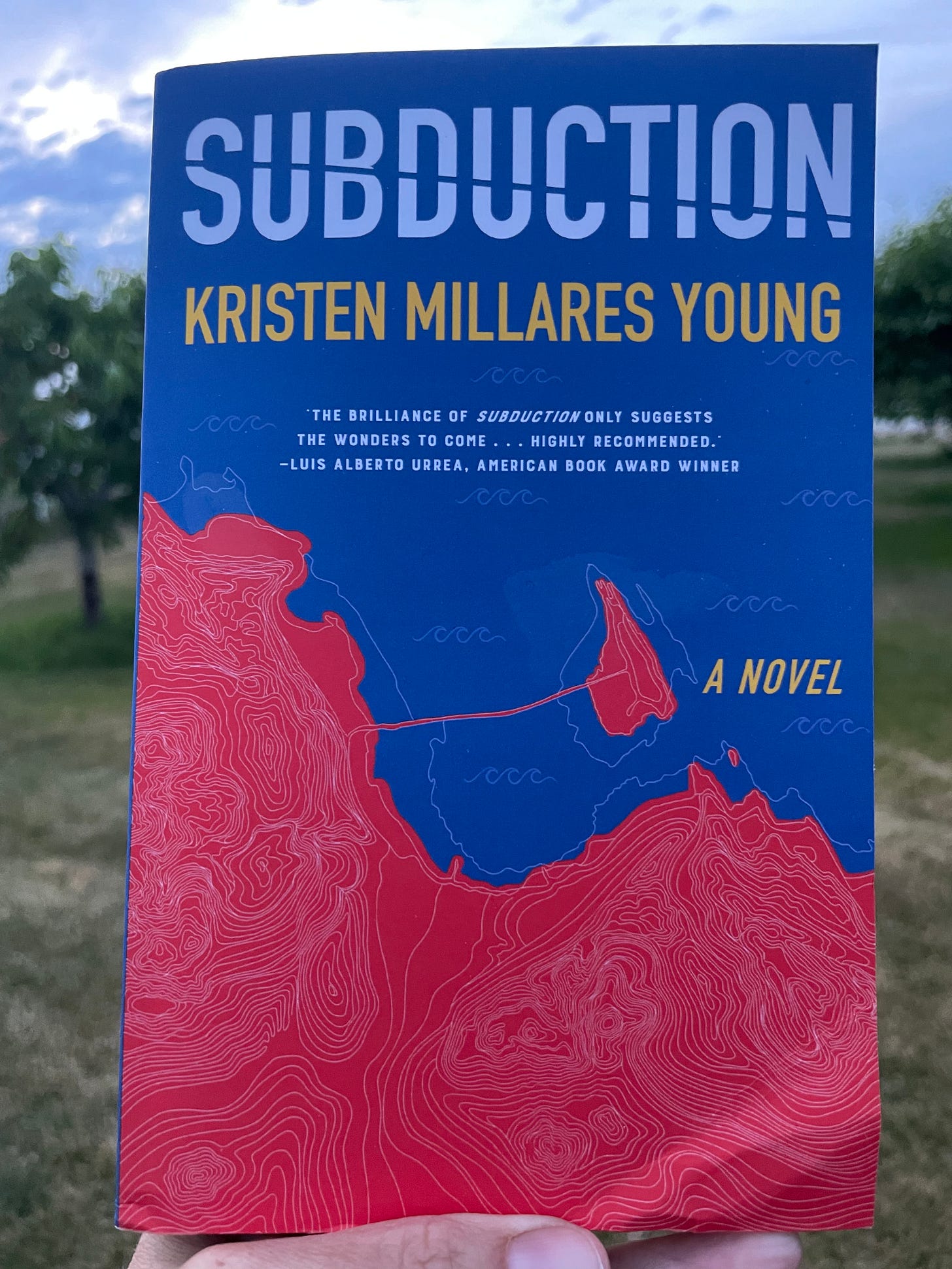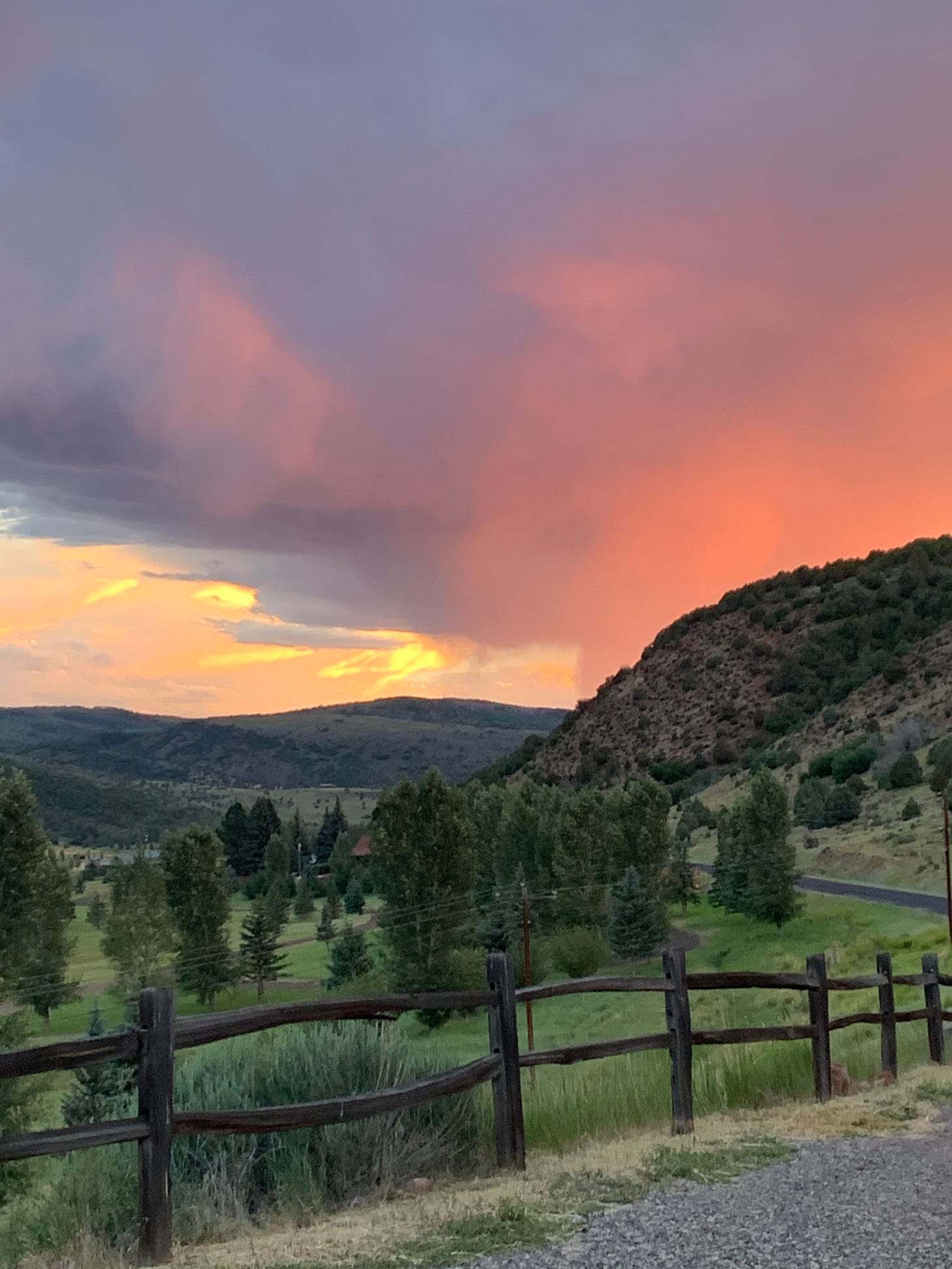Good morning from the road, friend.
Today you will write. Find a comfortable spot, ready a warm or cool beverage depending on what your climate is like right now, and soon we will begin.
This week’s writing encouragement comes from Kristen Millares Young, author of Subduction, the book I’m currently reading and LOVING. Its about an anthropologist that takes refuge after loss in Neah Bay, a Native whaling village, and how her life becomes entangled with the lives and memories of the people she meets there. Kristen is also an essayist and musician, and I came to know her just recently, when a friend rec’d her for a panel we proposed for AWP about writing novels with scientific inquiry as part of the main storyline. Kristen turned that plain cream of a panel proposal into a whipped delight and her skills in proposal writing align with what Kristen had to say when I asked her for the best advice she ever received.
Kristen said:
My advice boils down to this wisdom, received years ago: Be known as a closer, and always have multiple projects going.
Kristen elaborated:
Whatever you say that you are going to do, you do it.
This is such sound advice! Sometimes we can feel like we get a pass about things like meeting deadlines, arriving places on time and just generally doing what we say we will do b/c we are Artists. In my early twenties, I thought that if the muse called at 3 pm, I must just follow her and not break the spell by say, picking up a friend on time or going to class. But Kristen’s advice reminds us otherwise. There are a lot of flakey folks out there, so being someone that editors, writer friends, students, colleagues, and family can rely upon really does distinguish you. To be clear, I don’t think unreliability is nefarious and I’ve been so guilty of this in the past. To be the closer is perhaps also to treat ourselves with respect and kindness. We ARE enough to arrive on time and our writing is enough to be submitted by the 11:59 pm deadline (or even better, a day early!). I think many of us feel anxious about meetings and that is why we are late to them. Or we are worried that we haven’t written something good enough, which is why we miss deadlines. It is our emotions driving the bus and we are letting it lead, you know?

Last week, we stayed for a few days with friends in Portland, and one of my dearest pals, Jen, whom I met at the poet Carl Phillips’ house when we were poetry MFA students, has gone back to school to be a therapist, which I’m certain she will be terrific at, b/c she is one of those encouraging, listening, questioning friends who adore you and want the best for you.
After her adult therapy class one night last week, she told a group of us about a role-playing activity they did. She was the bus driver, she said, and other people in class were different emotions. Doubt, anger, anxiety, fear–all different students in the class role-playing–and they all tried to get on the bus Jen was driving.
What was the learning goal of the exercise? I asked.
You let all of the emotions on the bus, my friend said, but you are still the driver.
I pass this along to you for thinking about your everyday life but also for thinking about your writing. What if your feelings about writing are passengers on this bus, called your book project, and you are the driver? Somehow that shift from allowable/unallowable feelings to acceptance feels really calming to me. Like, you notice it instead of feeling in it or attached to it only: there is passenger number five, full of doubt and restlessness about this long project. Come on, swipe your card, find a seat next to passenger number 2, who feels like she is flying when the writing is going well. And let’s get going.
Worried about the daunting parts of revision or starting something new? Let those passengers on the bus or train. You can drive them to Canarsie, too, by which I mean the last stop. Or if you prefer the other direction, into the sunset.
I asked Kristen if her advice to be a closer was also true for her in writing, like if she feels like she needs to close (end) everything she opens (begins to write), but she said, The truth is that we suss out the viability of our ideas in the doing, and not every book is worth finishing, whether as a reader or a writer. But the general idea is that your word is good, and that you shouldn’t have to be reminded to fulfill your promises.
Thank you, Kristen, for offering us writing advice this week!
GIVING MORE THAN WHAT WAS ASKED FOR
Do you know Bhanu Kapil? Her book A Vertical Interrogation of Strangers is a go-to for me, but the real reason I’m thinking of her here is that for a long time she taught at Naropa, and when I lived in Boulder I’d go to the MFA program’s summer writing festival. I noticed that anytime Bhanu introduced a writer for an event (and there are a lot of events at that festival), she would not only say kind, generous things about the writers she was introducing, but she would give them a physical object: a gift that reminded her of them. I saw her give scarves, figurines, flowers. Kapil showed the value in giving people more than what they expected, as a general way of moving through the world. I loved this about her introductions. What would she give? What would remind her of this person? Everyone in the building was delighted by this generosity, I think.
Always be the closer. Give more than is asked.
As a younger person, I felt like I needed to protect myself and make sure people were not taking too much from me, a strategy I needed in childhood but no longer need. I gave little. Now, I try to give more. Maybe you have something like that, too? Something you needed to do or believed as a younger person that you can now let go of?
I guess in part that is what I see this newsletter as, a little thing I’m making, one that you help create. As a reader-supported publication, you support me in making it when you share it and subscribe. So, thank you!
A WRITING INVITATION FOR ENDINGS
This week I’m also thinking about the edits waiting for me when I get back home and how to evaluate when a story is done. Mostly, I believe we know more than we think we know about what is working and not working in our stories, essays, and poems. What a trusted reader does is affirm or deny what we already have a sense about. Of course, a good reader might show a mirror to your book or story that you could not see before (Thank you, Gene!), but still, in your own imperfectly beautiful way, you know a lot about your story. You know what is going on in your story, if you quiet the noise, and listen. You know the lines that sing and the paragraphs that need more attention. You do. Sometimes, what we are looking for is affirmation of what we already see, if we are listening to ourselves. (And often what we are looking for in a reader is the hope that others don’t see those places we do not want to revise, but they see them, and so do we.)
If you are wondering, about your writing project, Should I end here? try this: write a few paragraphs about what happens to the characters 10 years after the story ends. What can you see for your characters? Let that future be large. Include the land they live on, the work they do, the dwelling, the family that has passed away, the friends and chosen family they’ve made, the books they’ve finally gotten around to reading, the food they cook or wish they cooked—you know, all the daily things, their health concerns, what they wear, whatever feels energetic to you!
If what you find is that how you end things is pretty much more of the same ten years later, good news, perhaps you’ve found the right ending already! If you’ve left the door ajar on the characters’ lives, and a reader could almost look in and see, if not what happens, the light from that sun of what happens, ten years after the book takes place, then maybe it is good how it is.
But if something pretty different happens ten years later, you might reconsider how you end it, by continuing from where you left off. Or maybe you have a sequel book, like Mr. Bridge was to Mrs. Bridge. Or Tommy Orange’s forthcoming book. Or maybe, you have more to say in this book. Whatever it is, you can and will get there.
Let’s get on that writing bus. See you in Canarsie.
Fondly,
TS
You are reading Today You Will Write, weekly words of writing encouragement, that is entirely reader-supported. You can subscribe here or give a gift subscription here. Twenty-five percent of the proceeds go to non-profit organizations. This summer’s donation will also go to The Gathering Place in Denver, a drop-in center for women, transgender folx and children who are experiencing poverty and/or who are unhoused, so that they may find respite and resources.
P.S. A few personal notes from the road:
Keep reading with a 7-day free trial
Subscribe to TODAY YOU WILL WRITE to keep reading this post and get 7 days of free access to the full post archives.






